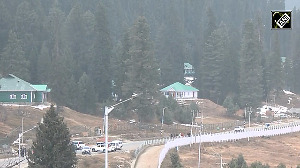Stung by power outages and impending rural expansion plans, telecom companies, both equipment vendors and operators, are looking at alternative energy sources to expand their footprints across rural India.
The companies are looking at tapping solar power, wind energy and bio-fuels, including fish and vegetable oil, to run base transceiver systems in areas with poor power supply.
Companies such as Ericsson AB, Reliance Communications, Idea Cellular, Vodafone Essar and state-owned BSNL and MTNL are looking at alternative fuels to power their towers. A BTS needs around 500 watts of uninterrupted power.
"The industry needs uninterrupted power to roll out services in rural and semi-urban areas. Erratic power, apart from delaying the rollout of the services, also affects the quality of services," Association of Unified Telecom Service Providers of India Secretary General S C Khanna told Business Standard.
At present, the companies are using diesel gensets. However, diesel is expensive compared to electricity, and the transportation of fuel to remote areas is also problematic, he added.
The world's largest manufacturer of wireless networks, Ericsson AB, has set up four towers that run on fish and vegetable oils. The towers are all greenfield sites put up for Aditya Birla group company Idea Cellular in Maharashtra circle.
According to Idea Cellular Managing Director Sanjeev Aga, "The use of biofuels is helping us to bring communication facilities to rural communities in India."
P Balaji, Ericsson vice president (marketing and strategy), says: "Generating biofuels from bio-mass and molasses will create job opportunities for local communities as they would be involved in the production of these fuels. Moreover, these fuels are environment-friendly and help in reducing carbon di-oxide emissions by around 70-80 per cent compared to diesel."
Reliance Communications has begun tapping wind and solar power to ensure uninterrupted power supply for its network. On the wind energy front, the telephony major has installed windmills on its towers at Kunustara and Murugathal near Durgapur in West Bengal.
The company is also looking at using solar power to run its cell sites and has initiated talks with Pune-based solar panel manufacturer Machinocraft.
Reliance Communication is planning to run 10,000 sites using either solar power or wind power by the end of this year.
The company's Group President (finance & treasury) Ramesh Venkat said wind and solar energy were being used in areas with little or no power.
On a rough estimate, a wind power turbine or a solar panel mounted on towers will generate around 1,800-2,000 watts during peak sunshine hours or high-windy days. Of this, the repeater sites consume up to 500 watt each, while the remaining is stored in batteries and used to power the network at night or low windy times.
While Hutch is also looking at wind turbines, state-owned telecos are experimenting with multiple sources like solar, wind, gobar gas and biofuel from molasses.
But there are questions regarding their sustainablity. GTL's -- a company providing telecom infrastructure -- Chairman and Managing Director Manoj Tirodkar has another view.
"Every company, including GTL, are experimenting with alternative fuels in rural areas. But when it comes to faster and larger rollouts of infrastructure, diesel gensets are still the reliable mode of power in the rural sector".
This is because alternative fuels are mostly used on an experimental basis and its commercial viability is under undergoing trials. But with a target of 500 million connections by 2010, every bit of innovation is welcome, he adds.






